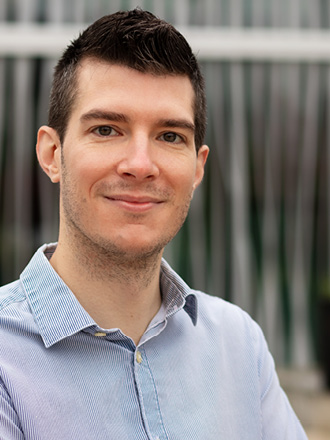Keynote Lecture
Wednesday, September, 28th, 2022: 05:30 pm
Chair: Marta Ferreira Gomes

Exploiting the power of single-cell genomic technologies to enable data-informed cytometry
Abstract
Single-cell genomic technologies have transformed our understanding of complex cellular systems. However, excessive cost, a low cellular throughput and a lack of strategies for the purification of newly identified cell types impede their functional characterization and large-scale profiling. Unlike single-cell transcriptomics, flow cytometry offers a massive throughput in terms of samples and cells, is commonly used in the clinicsand remains unrivaled in the ability to prospectively isolate live populations of interest for downstream applications. However, flow cytometry provides low-dimensional measurements and relies on predefined sets of surface markers and gating strategies that have evolved historically in a process of trial and error. In this talk, I will provide insights into how to most efficiently use both technologies and how to empower integrated single-cell transcriptomic and surface-proteogenomic assays to rationally design cost-effective high-throughput cytometry schemes that outperform state-of-the-art approaches, accurately reflect complex topologies of cellular systems and permit the purification of precisely defined cell states.
Affiliation
- Berlin Institute of Health (BIH) at Charité – Universitätsmedizin Berlin, Berlin, Germany
- Berlin Institute for Medical Systems Biology, Max Delbrück Center for Molecular Medicine in the Helmholtz Association, Berlin, Germany
- Charité-Universitätsmedizin Berlin, Corporate Member of Freie Universität Berlin, Humboldt-Universität zu Berlin, Department of Hematology, Oncology and Cancer Immunology, Berlin, Germany
- Division of Stem Cells and Cancer, Deutsches Krebsforschungszentrum (DKFZ), and DKFZ-ZMBH Alliance, Heidelberg, Germany
- Heidelberg Institute for Stem Cell Technology and Experimental Medicine (HI-STEM gGmbH), Heidelberg, Germany
- German Cancer Consortium (DKTK), Heidelberg, Germany
Biosketch
As of 2020, Simon Haas is an independent group leader at the Berlin Institute of Health (BIH), the Charité university medicine and the Berlin Institute of Medical Systems Biology (BIMSB) at the Max Delbrück Center (MDC) in Berlin, Germany. He is also an associated group leader at the German Cancer Research Center (DKFZ) and the Heidelberg Institute for Stem Cell Technology and Experimental Medicine (HI-STEM gGmbH), Heidelberg, Germany. Simon studied Molecular Cell Biology, Biochemistry and Molecular Biosciences at Heidelberg University, Imperial College London and the DKFZ. He received his PhD from DKFZ and Heidelberg University in 2016. He performed research at DKFZ, Massachusetts Institute of Technology (MIT) and Harvard. His research focus is to understand the blood and immune system, and how it contributes to disease, in particular cancer. For this purpose, his lab develops single-cell transcriptomic, genomic, surface-proteomic, functional and spatial technologies, and combines those with classical approaches from the fields of immunology, stem cell biology and cancer. As part of the hematology, oncology and tumor immunology and core member of the BIH / MDC focus area ‘Single-Cell Approaches for Personalized Medicine’ one of his main goals is to transform single-cell technologies into precision oncology approaches that provide ultra-precise diagnostics, prognostics and guide therapy choice in cancer therapy.